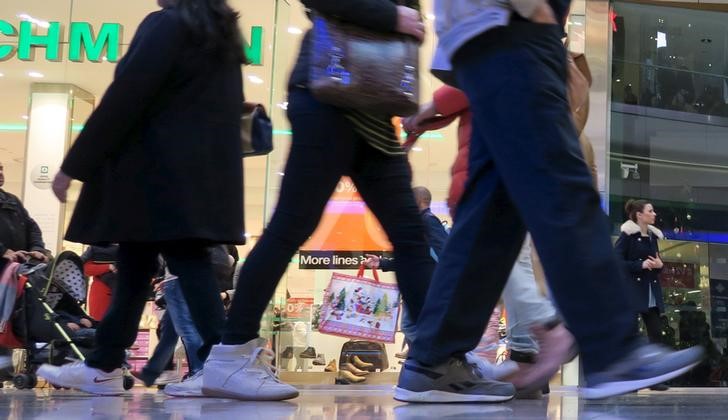LONDON, May 19 (Reuters) - - British retail sales bounced back much more strongly than expected in April, despite cold weather dealing a big blow to spring clothing sales compared with last year, official figures showed on Thursday.
Retail sales volumes rose 1.3 percent on the month in April, the Office for National Statistics said, well above economists' average forecast of 0.5 percent growth.
The ONS also significantly revised March's figures, showing retail sales fell just 0.5 percent on the month, a much smaller decline than the 1.3 percent drop it had previously estimated, due to more late data than normal from some large stores.
Compared with a year earlier, sales volumes were up 4.3 percent, beating all forecasts in a Reuters poll.
"Clothing stores remain the main drag on growth in the retail sector, with sales hampered by unseasonal weather. However ... sales increased in April compared with March as lower prices boosted sales," ONS statistician Melanie Richard said.
But looking at sales in the three months to April - which smooths out some volatility in the data - volumes were up just 0.3 percent compared with the previous three-month period, the weakest growth since September 2014.
Consumer spending has been a major driver of Britain's economic expansion over the past three years, but household confidence has faltered slightly in recent months in the run-up to a June 23 referendum on European Union membership.
Colder than usual weather has also dented spending in March and April, hurting demand for spring and summer clothes, according to the ONS and earlier surveys from the British Retail Consortium and the Confederation of British Industry.
The ONS said clothing sales were 6.3 percent down on the year, the sharpest drop in four years, although they rose 1.3 percent on the month due in part to price reductions.
The CBI said retail sales in April fell at the sharpest rate in over 4 years.
The BRC said retail spending in April was 0.9 percent lower than in 2015. A comparable figure from the ONS showed sales were up 1.2 percent, in part reflecting a 2.8 percent fall in the average price of goods sold.
Market research company GfK said consumer confidence in April was its lowest since December 2014, due to concerns about the EU referendum.
The ONS said it had received no anecdotal evidence from retailers that demand was being affected by the referendum.

Last month British finance minister George Osborne warned households they would be 4,300 pounds a year poorer by 2030 if they voted to leave the EU.